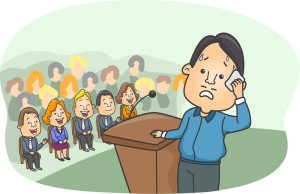It’s important to celebrate the storied heritage of the meetings and speaking industry, for as a wise person once warned us, “Those who forget the past are doomed not to remember it.” So in an effort to ensure we are not doomed, I hereby present a brief history of meetings.
- The first meeting occurred when Adam met Eve. This is believed to be the first time the phrase “Casual Friday” was used, as well as being the first meeting where food was an integral part of the meeting experience.
- Unknown Neanderthals invent the earliest form of “brainstorming” in France. The process dies out, however, due to time constraints involved in capturing everyone’s ideas on cave walls.
- Circa 7000 BC: Chickens are domesticated, for which budget-conscious meeting planners remain eternally grateful.
- The first team building events are thought to have occurred during the Roman Empire. Although most participants didn’t survive their “team building experience,” the spectators seemed to
 immensely enjoy these events.
immensely enjoy these events.
- Circa 1350: The term “lectern” first appears in the fourteenth century as lettorne, from the Latin word lectrum, which translates roughly into, “people will forever more confuse this with ‘podium’ so why even bother?”
- Circa 1370: The term “podium” comes into use. It is derived from the Greek word pothi meaning, “are you sure you don’t mean a lectern?” (The word “podiatrist,” coined shortly afterwards, refers to carpenters who specialized in fixing decrepit podiums.)
- Circa 1400: After years of sitting at rectangular tables, The Knights of the Round Table come to the sudden realization that they either had to change their association’s name or invent a round table. Thus, the first use of round tables is deployed at meetings, thereby allowing meeting planners to save money by cutting corners.
- 1814: Thought to be the seed of the modern meetings industry, the Congress of Vienna (convened to redistribute the territories after Napoleon’s wars) was held from September 1814 – June 1815, prompting the person recording the minutes to suggest, “Hey, couldn’t we do one of these things in like three days next time?”
- 1865: Mark Twain (1835-1910) coins the phrase “speaking circuit.” This phrase continues to serve as both a source of inspiration and frustration for aspiring professional speakers.
- 1880: Mark Twain utters the pithy quote, “Get your facts first, then you can distort them as you please,” a phrase that continues to serve as an inspiration to new speakers.
- 1882: Pithy Mark Twain utters the quote, “Too many after dinner speakers are merely after dinner” – prompting meeting planners to consider the use of speakers after breakfast and lunch as well.
- 1888: Gus Argleson is the first after dinner speaker to completely bomb and is thus credited as being the first speaker in history to say, “I’m never doing another after dinner talk as long as I live.”
- 1893: The term “snake oil salesmen” is coined after cowboy Clark Stanley, the “Rattlesnake King,” who sold Snake Oil Liniment at the Chicago World Fair. He was eventually fined by the Department of Agriculture after his claims were proven false and discovering that the liniment contained no snake oil. The term stuck and is sometimes applied to speakers using terms such as: “secret,” “law,” “attraction,” or “bestselling author.”
- 1896: The first convention bureau was established in Detroit, Michigan. Detroit also becomes the first city to employ a salesman to invite meetings to their town. Some meetings said, “Hey, why not? What’s not to love about Detroit in mid-January?” while other meetings said, “I don’t get it? How can meetings talk?”
- John Henry Patterson (1844-1922), president of the National Cash Register Company, pioneers sales training and, more importantly, invented the flip chart. (Sadly, his invention languished for decades until someone finally located flip chart markers that weren’t dried out.)
- 1948: Advertising executive Alex Osborne resurrects the ideation technique of brainstorming after visiting some caves in France.
- 1972: Meeting Planners International is formed. Shares in companies that manufacture flip charts skyrocket.
- 1987: The introduction of PowerPoint™ (originally known as ‘Presenter’) allows speakers to stop handing out View-Masters™ to audience members.
- 2007: South Korea introduces the first robot emcee, saving delighted meeting planners one extra hotel room and meal serving.
- April 2016: A Winnipeg-based meeting breaks a world record for the longest ever panel discussion – coming it an over 748 feet long, the panel stretched longer than an entire city block.
As for the future of meetings? That’s a topic we’ll turn to in the future.
Michael Kerr is a Canadian Hall of Fame Speaker, highly in-demand international keynote speaker, and the creator of the Culture Leadership Online Academy. Michael is also the author of 8 books, including: The Humor Advantage: Why Some Businesses Are Laughing All the Way to the Bank; Hire, Inspire, and Fuel Their Fire; and The Jerk-Free Workplace: How You Can Take the Lead to Create a Happier, More Inspiring Workplace. www.MikeKerr.com


